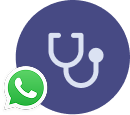What is breast cancer screening?
There are two ways in which breast cancer screening is conducted in Singapore, these are:
Mammogram: the gold standard for breast cancer screening. It is recommended for women aged 40 and above. A mammogram involves taking low dose x-rays of the breasts to identify early signs of breast cancer.
Ultrasound: used in women below the age of 40. An ultrasound involves the use of sound waves to detect the presence of abnormalities in breast tissues.
Depending on a woman's age (40 and above), an ultrasound cannot be used as a replacement for a mammogram but rather as a complement to rule out other abnormalities such as cysts and nodules.
For women below the age of 40, ultrasounds are adequate for breast cancer screening. Ultrasounds are also safe to use in pregnant women since unlike a mammogram, it does not involve the use of x-rays.
The early detection and treatment of breast cancer are key to survival since cancer cells are easier to treat when they are still small or in their early stages. Breast cancer screening does not prevent you from developing breast cancer, however, it can help to detect cancer cells in their early stage so that treatment can be arranged before it spreads or grows.
1 in 13 women in Singapore will get breast cancer in their lifetime. Early detection can save your life.
Get screened today.

Common signs of breast cancer in Singapore
The most common sign of breast cancer is discovering a new lump or mass in your breast. Sometimes these lumps may not be cancerous and might indicate another condition. Lumps or masses that are hard with irregular edges or soft, round and tender can be a sign of breast cancer. An ultrasound together with a mammogram will be used to identify the mass in your breast.
Other signs or symptoms of breast cancer include:
Nipple or breast skin that is red, dry, or has flaking and thickened skin
Swollen lymph nodes under your arm or near your collarbone
All women are at risk of developing breast cancer, and this risk increases with age & family history of cancer.
Get screened today.

Benefits of breast cancer screening
- Early detection of breast cancer
- The earlier breast cancer cells are detected, the easier it is to treat and the higher the chances of complete recovery
- Lower the risk of mortality from breast cancer
- Quick, 30-min procedure
How painful is a mammogram?
Most women have reported a mammogram to be an uncomfortable process, but it should not be painful unless you have underlying conditions.
The level of discomfort can depend on the size of the breasts, the skill and experience of the technologists, and how much needs to be pressed in order to get a clear image during the mammogram.
How often should I go for breast cancer screening?
Breast cancer screening or a mammogram should be done yearly when a woman reaches between the ages of 40 to 49 years old. However, if you are between the ages of 50 to 74 years old, it is recommended to get a mammogram once every 2 years.
If you are below the age of 40, conduct regular self-examination of your breasts and make an appointment with your doctor if you notice any abnormalities.


























